The Madrid exception: Why not even a pandemic has killed the city’s nightlife
While many European countries have closed bars and nightclubs in a bid to contain the coronavirus, the regional government says such a measure is “unthinkable”
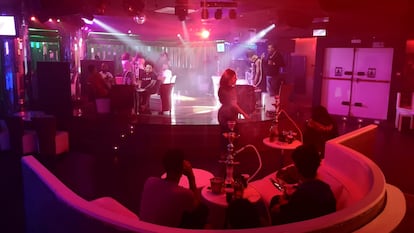
The DJ at Republik turns off the music and tells the crowd: “Please, everyone go to your table and put on your face mask. The police are going to come in and there are journalists outside.” Republik is an electronic music club in the center of Madrid, one of the few capital cities in Europe where the party has not stopped. When the DJ makes the announcement, there are young people, without shirts and without face masks, dancing to the beat of Juseph León. There’s sweat and yelling – all in an enclosed space, with aerosols floating in the air. It’s the perfect combination of conditions for the coronavirus to spread.
In the bathrooms, people are having sex and taking pills, according to a 28-year-old who asked to remain anonymous. He describes a scene last Saturday in Madrid: “I took ecstasy with someone else in the bathroom. Electronic music, drugs and partying like in the times before the pandemic.”
Officers from the National Police force arrive, sirens blaring, at 8.22pm. They file in firmly, as though they were about to raid a clandestine bar. But surprisingly it’s all over in the blink of an eye. There are no fines and within 15 minutes everything is back to normal. “We received a call but everything is in order,” explains an officer, while standing outside Republik. When the club attracts the attention of some passers-by, he warns them not to go in because it’s poorly ventilated. “Be responsible,” he says.
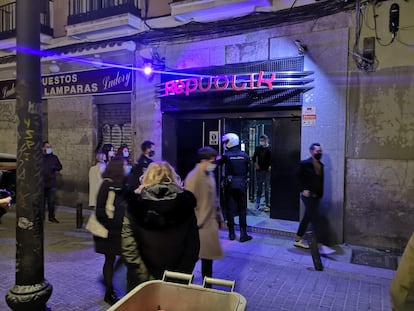
The police can’t do anything because Republik is complying with an order, issued by the Madrid regional government on October 14, that allows venues to open their doors as long as they follow coronavirus safety measures – the dancefloor can’t be used, patrons must be seated at tables and the venue must close at midnight, when the nighttime curfew begins. But these rules can be easily broken if the police are not there and there is no one to report the club. An hour-and-a-half later in Republik, the police are back and this time they do find people breaking the rules.
Cities such as Berlin, Paris and London have suspended nightlife activities, but thanks to Madrid’s relaxed measures, the party is still going on in the Spanish capital. The Madrid regional government, run by a center-right alliance of the Popular Party (PP) and Ciudadanos (Citizens), and propped up by the far-right Vox, believes that nightclub owners and residents looking for a fun time can be trusted to act responsibly. In the center of Madrid, families and young people spend the weekend hopping from one bar to the next. What was previously known as tardeo, or going out in the afternoon, has now become the norm. Drinks begin at a sidewalk café after lunch and continue in nightclubs like Republik, in the Madrid neighborhood of Malasaña, which open at 6pm. Where once the party began at midnight, now it begins before dinner.
Nightclubs know they are being watched. Republik is one of the many that offer dance music as well as food, an extraordinary concession made by the Madrid government last month to help these venues increase revenues during the pandemic. Clubs such as Independance, Teatro Gran Maestre, Chanoe, Kabaret 3.0 and Avenue Madrid advertise their events on social media. But it’s not that easy to get in. The security guards at the door are suspicious of newcomers and say that entry is by reservation only to filter out anyone who might report the club. The venues share a blacklist of journalists along with their photos. Before the police arrived in Republik, a television crew and several reporters were standing at the door, having heard that the club was disrespecting the coronavirus safety measures.
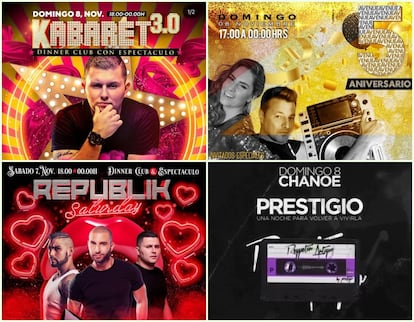
Residents do notify the police about places that are breaking the rules. Defeating the coronavirus is a collective effort and the idea that the sacrifice of many is meaningless thanks to the irresponsibility of a few is painful. A group of young people who see the reporters outside Republik say they are on their way to the police station to report the bar El Tigre del Norte, in the central neighborhood of Chueca. They left the place because it was not respecting the limits on capacity. Indeed there was so little space people were standing up and sharing tables. Almost nobody was wearing a face mask.
“I’m outraged because I study musical theater and we don’t even take our face masks off to eat,” says a 20-year-old woman.
In normal times, El Tigre del Norte has capacity for 112 people, but the Madrid government’s rules have reduced this by half. The bar has a security guard to limit who comes in, but he is letting anyone pass through, even though the place is jam-packed. From the bar, a waiter sees a couple who have just arrived and asks what they want. They order two beers (€6) and the waiter serves them a plate of ham, fries and croquetas. “At the back, at the back, you’ll find a spot,” he tells them, yelling to make himself heard above the music and noise. “There’s ventilation, don’t worry.” Nothing could be further from the truth. It’s chock full.
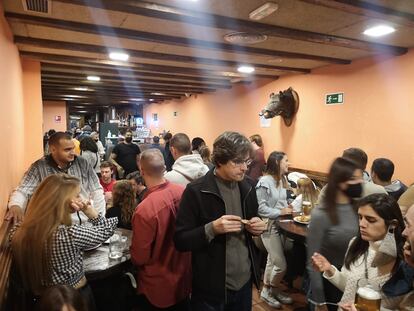
Madrid authorities believe that their strategy to contain the spread of the coronavirus, which allows bars and restaurants to remain open, is a “creative formula” to save lives and the economy. Madrid Mayor José Luis Martínez Almeida, from the PP, called on the public last Friday to go out for “a few beers,” while the premier of Madrid, Isabel Díaz Ayuso, said closing down the hostelry sector was “unthinkable.”
Many bars and restaurants are making an effort to respect the safety measures, but it is impossible to keep watch on every single one in the Madrid region, which before the pandemic was home to more than 31,000 of these businesses.
The police are continually patrolling the city’s nightlife hotspots. In Madrid’s AZCA financial district, a popular haunt for university students, a police car passes practically every half hour. There is very little atmosphere on the street. Many nightclubs remain closed and almost every one that is open is at capacity.
But there is space at Center Mambo Latino. Inside, around 30 young people are drinking whisky and smoking from hookahs, seated on sofas in groups of no more than six. Before entering, the doorman does a temperature check and offers hand sanitizer. Every now and then, the club issues a reminder about the pandemic over the loudspeaker: “Help us protect you. Management appreciates your cooperation. Thank you.”
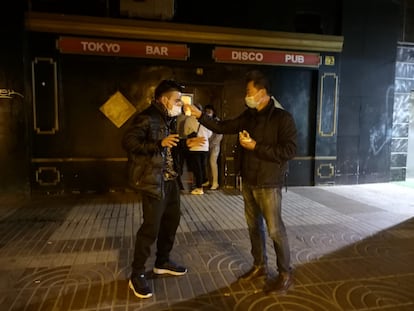
In front of Center Mambo Latino, Chungki Ji, alias Juan, is eating a hamburger outside his bar, Tokyo Bar Disco Pub. He says the pandemic is ruining him. He only opened Tokyo Bar Disco Pub because he needed to reduce his losses. He pays €2,000 a month in rent and there are nights where he only makes €50. Ji supports Madrid’s decision not to close the hostelry sector, as has been done in other countries as well as the Spanish regions of Asturias, Castilla y León, Navarre, Murcia, Galicia and Catalonia. According to Ji, if this happened, “young people would be burning trash containers.”
At 10.50pm, a worker at the nightclub Faces warns patrons that police officers are inside. It comes too late. There are 75 people in the club, many mingling on the dancefloor without wearing a face mask. The officers clear out the space and fine five people for refusing to put on a mask.
As midnight approaches, AZCA becomes witness to scenes more commonly seen in the early hours of the morning. The stumbling drunk guy, the kissing couple and the questions about where to take the party next. A group of three young people, aged between 19 and 20, finish their drinks at a sidewalk bar and prepare to go home. They don’t know any nightclub that’s secretly open after midnight. The only alternative is to see if someone is willing to volunteer their house for an after-party.
Ricardo, a 20-year-old advertising student, is going home. He says he takes the coronavirus seriously: “Two close family members have died and I don’t want to risk it.”
His friends from university, Carlos, who is studying law, and Gonzalo, who is studying data engineering, are of a similar mind. They are upset that all young people are stereotyped as selfish and irresponsible. Carlos believes that just 5% behave badly. When the bar is about to close, a group of three women asks the guys if they want to go to an apartment in Castilla square. There are dividing opinions. This is the moment when some people are more responsible than others.
English version by Melissa Kitson.
Tu suscripción se está usando en otro dispositivo
¿Quieres añadir otro usuario a tu suscripción?
Si continúas leyendo en este dispositivo, no se podrá leer en el otro.
FlechaTu suscripción se está usando en otro dispositivo y solo puedes acceder a EL PAÍS desde un dispositivo a la vez.
Si quieres compartir tu cuenta, cambia tu suscripción a la modalidad Premium, así podrás añadir otro usuario. Cada uno accederá con su propia cuenta de email, lo que os permitirá personalizar vuestra experiencia en EL PAÍS.
¿Tienes una suscripción de empresa? Accede aquí para contratar más cuentas.
En el caso de no saber quién está usando tu cuenta, te recomendamos cambiar tu contraseña aquí.
Si decides continuar compartiendo tu cuenta, este mensaje se mostrará en tu dispositivo y en el de la otra persona que está usando tu cuenta de forma indefinida, afectando a tu experiencia de lectura. Puedes consultar aquí los términos y condiciones de la suscripción digital.








































